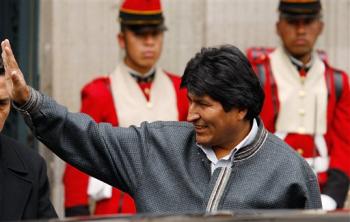
(above) Bolivia's President Evo Morales waves to supporters
as he leaves the presidential palace in La Paz, Tuesday, Oct. 7, 2008.
(AP Photo/Juan Karita)
Morales: Bolivia should not fear US 'blockade'
October 7, 2008 - Associated Press
By DAN KEANE – 12 hours ago
LA PAZ, Bolivia (AP) — The U.S. is set to suspend a trade deal with Bolivia that is worth 20,000 Bolivian jobs and $150 million a year, but President Evo Morales says South America's poorest country shouldn't worry.
"We don't have to be afraid of an economic blockade by the United States against the Bolivian people," Morales said Tuesday during a visit to southern town of Vallegrande, near where Cuban revolutionary Ernesto "Che" Guevara died in 1967.
Even so, his government announced it would send a delegation to Washington later this month to lobby for the country's continued participation in a regional trade pact rewarding Andean nations for cooperating with U.S. anti-narcotics efforts.
The Andean Trade Promotion and Drug Eradication Act has given Bolivia breaks on some U.S. tariffs since 1991. But a rapidly souring relationship between the two countries has put the deal at risk.
Morales booted the U.S. ambassador last month, accusing him of supporting his conservative opponents, which the former ambassador denies. The U.S. sent Bolivia's top diplomat home in response.
Bolivia's recent demands that U.S. development projects and Drug Enforcement Administration officials to leave the Chapare, a coca-growing region in the country's central Andean foothills, prompted Washington to place Bolivia on an anti-drug blacklist last month.
The "decertification" of Bolivia's anti-drug efforts triggered U.S. President George W. Bush to recommend the suspension of Bolivia's participation in the trade deal. The U.S. Trade Representative is expected to decide by month's end on whether to suspend the deal, which covers the import of Bolivian jewelry, textiles, and wood products, among other products.
Thomas Shannon, the top U.S. diplomat for Latin America, told The Associated Press last week that the deal's suspension would not necessarily be permanent.
"If we can come to terms on our counterdrug cooperation...then we will be able to restore these ATPDEA benefits," he said. "We haven't shut the door."
The United States is Bolivia's third largest trading partner after Brazil and Argentina. Bolivian government and business leaders estimate the suspension of the trade deal could cost the country some 20,000 jobs.
But Morales recalled that, long before his election as the country's first indigenous president in 2005, he and then Cuban President Fidel Castro discussed the possibility that the U.S. might cut commercial ties to Bolivia.
"I asked him, 'What happens if someday I'm president and the U.S. puts an economic blockade on Bolivia?'" Morales said Tuesday. "You know what Fidel told me? First, Bolivia's not an island like Cuba. Second, Bolivia has countries like Cuba, Venezuela, Argentina, and Brazil. And third, Bolivia has so many natural resources — hydrocarbons, petroleum."
Associated Press writer Frank Bajak contributed to this report from Bogota, Colombia.